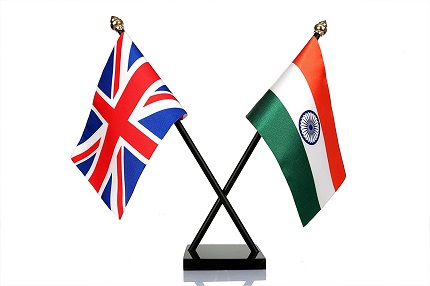GJEPC connected India and UK as part of its Virtual Business Meet held on 28th September

Gem & Jewellery Export Promotion Council, the apex body of gem & jewellery trade in India, organised an exclusive Virtual Business Meet on 28th September in order to connect Jewellery Manufacturers from India and leading Retailers/wholesalers of UK.
Gracing the occasion were Mr. Manish Singh, Minister (Economics) at the Indian High Commission, UK; Mr. Rohit Vadhwana, First Secretary (Economics) at the Indian High Commission, UK along with Mr. Colin Shah, Chairman, GJEPC; Mr. Mansukh Kothari, Convener, Events, GJEPC; Sabyasachi Ray, ED, GJEPC and top jewellery manufacturers from India and leading Retailers/wholesalers of UK.
The UK-based panelists included: Andrew Hinds of F Hinds / Chappelle; Andrew Morton of Weston Beamor; Emmet Cummins of Master Jewellers; Gary Wroe of Hockley Mint, Gemma Murphy of Jack Murphy; Helen Dimmick, Independent Consultant and a representative of the National Association of Jewellers; Mehul Lodhiya, a UK importer and honorary representative of the GJEPC; Pravin Pattni of Minar Jewellers; Paul Beesley, Baird & Co; Richard Hunt of Richard Hunt Jewellers; and Samantha Somers, Watches of Switzerland.
Sharing the Indian perspective were: Kunal Mehta of Diatrends Jewellery Pvt. Ltd.; Milan Chokshi of Tanvirkumar & Company , Vikram Advani of Goldstar Jewellery Pvt. Ltd.; Puneet Verma of Hare Krishna Jewels; Bhaumik Gajera of Laxmi Diamond Pvt. Ltd.; Shrenik Lunawat of Lunawat Gems Corporation; Ornamentations India Pvt. Ltd.; Darshit Hirani of P. Hirani Exports LLP; Rimesh Shah of Sheetal Diamonds Ltd., and Aswini Agarwal of Vaibhav Global.
Speaking about the current trade between India and the UK, Mr. Colin Shah, Chairman, GJEPC said, “The gem and jewellery trade between India and the UK has doubled from $555 million in 2015 to $1.3 billion in 2018. The UK ranked 9th among India’s key export partners in gems and jewellery and there is potential to increase the country’s export share in the UK. GJEPC has been proactive in leveraging the digital platform to put together virtual business programs in order to connect with buyers from the globe and further exports.
“The Indian gem and jewellery industry has been catering to different markets in the world; its annual gem and jewellery exports account for USD 36 billion; employs 4.3 million people, there are 10 special economic zones which superior infrastructure, advanced tech, highly skilled workers. We are sure that we will not only sustain but also grow this position in years to come” added Colin.
In his opening remarks, Mr. Manish Singh, Minister (Economics) at the Indian High Commission to the UK, said “It is essential to promote bilateral trade between India and the UK, especially in the gems and jewellery sector. There are some challenges in Customs duty and accounting aspects, but there are robust government-to-government mechanisms already in place to deal with such issues at the highest level.”
Rohit Vadhwana, First Secretary (Economics) at the Indian High Commission, informed that gems and jewellery is one of the top 5 traded items between India and the UK, and hence it is an important segment for the leadership of both countries.
Mansukh Kothari, Convener, Events said, “The jewellery segment is now matured and fully developed with highly talented designers and skilled artisans, creating the widest possible range of jewellery. From mass produced diamond jewellery designed for Europe or USA, to exquisitely crafted designer jewellery in plain gold or studded with diamonds and coloured gemstones, India offers it all.”
The panel moderator David Brough of Jewellery Outlook magazine engaged both sides in a free-flowing discussion on the possible avenues for enhancing trade opportunities between the two countries. He noted, “We are in the midst of a digital transformation of the gems and jewellery industry, and India is right at the forefront of this change with its virtual buyer-seller meetings and trade shows. The take up has started very well, and keep an eye out in this regard, the full range of offerings that India provides will increasingly be available through the GJEPC’s virtual portals.”
Among the key Indian exports to the UK are gold jewellery, cut and polished diamonds, and silver jewellery, while India’s main imports from the UK are platinum bars, rough diamonds, and lab-grown diamonds. The discussion touched upon the various aspects of the trade.
UK retailers and designers have had a long-standing partnership with Indian manufacturers. Ongoing collaboration and design narratives will further strengthen these ties.
One major challenge for UK retailers is the lack of consolidated shipping which makes individual orders from India prohibitively expensive compared to other overseas suppliers. If that could change, it would make a significant difference.
Indian manufacturers can do well to respond to the market opportunities in the UK for increase in demand for bespoke jewellery as it is the biggest growing category in recent times. UK can tap India’s phenomenal resources in handcrafted and technology-driven manufacturing processes.
UK retailers are looking to develop individual brands and Indian manufacturers could work together and develop brands under the umbrella of individual retailers. UK is seeing a pricing opportunity to purchase more platinum, but it is interesting that the increasing gold price has almost reaffirmed the value and preciousness of the yellow metal. UK is seeing a renewed interest in yellow gold set with coloured gemstones for engagement rings. There is an increasing mixing of metals, but platinum is still dominating the UK diamond engagement ring market.
Old-cuts, fancy cuts, salt pepper diamonds are popular, reflecting people’s choices of celebrating imperfections. Consumers are appreciating the importance and rarity of diamonds. Rainbow coloured gems are popular, with tanzanite, peridots, aquamarines topping the charts.
Be the first to comment